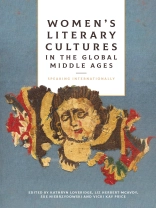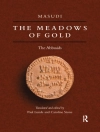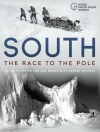Initiates a wider development of inquiries into women’s literary cultures to move the reader beyond single geographical, linguistic, cultural and period boundaries.
Since the closing decades of the twentieth century, medieval women’s writing has been the subject of energetic conversation and debate. This interest, however, has focused predominantly on western European writers working within the Christian tradition: the Saxon visionaries, Mechthild of Hackeborn, Mechthild of Magdeburg, Gertrude the Great, for example, and, in England, Julian of Norwich and Margery Kempe are cases in point. While this present book acknowledges the huge importance of such writers to women’s literary history, it also argues that they should no longer be read solely within a local context. Instead, by putting them into conversation with other literary women and their cultures from wider geographical regions and global cultures – women from eastern Europe and their books, dramas and music; the Welsh gwraig llwyn a pherth (woman of bush and brake); the Indian mystic, Mirabai; Japanese women writers from the Heian period; women saints from across Christian Europe and those of eleventh-century Islam or late medieval Ethiopia; for instance – much more is to be gained in terms of our understanding of the drivers behind and expressions of medieval women’s literary activities in far broader contexts.
This volume considers the dialogue, synergies, contracts and resonances emerging from such new alignments, and to help a wider, multidirectional development of this enquiry into women’s literary cultures.
Inhoudsopgave
Foreword
Diane Watt
Acknowledgements
List of Abbreviations
Introduction: Medieval Women’s Literary Cultures and Thinking Beyond the Local
Liz Herbert Mc Avoy and Sue Niebrzydowski
PART 1: Comparison and Dialogue
1. Speaking Across the Stars: Parallel Affective Communities in Islamic and Christian Hagiography
Ayoush Lazikani
2. Women’s Mystical Friendships: Margery Kempe and Mirabai
Alexandra Verini
3. Women’s Writing in the Japanese Heian Period: A Medieval Dialogue between the East and West
Naoë Kukita Yoshikawa
PART 2: Constructing Gender and Genre
4. The Genre of the Late Medieval Personalised Orthodox Slavic Women’s Miscellany: Three ‘Existential’ Questions
Michel de Dobbeleer
5. The Role of Kisaeng
Sijo Poets in Medieval Korean Literature
Ko Jeong-hee and Justin M. Byron-Davies
6. Rabi’a al-‘Adawiyya: Gender, Authority and Paradox in Attar’s
Tadhkirat al-‘awliya and the
Mantiq al-tayr
Shazia Jagot
7. Deception, Infanticide, and the Making of a Female Saint: A Look at the
Gädl Krəstos Śämra
Meron T. Gebreananaye
PART 3: Saintly Performance and Marian Piety
8. ‘Of our Lady thassumpcion’: A European Context for the Worshipful Wives of Chester and their Marian Play
Sue Niebrzydowski
9. Mary and Elizabeth: Male Perspectives of Female-Coded Piety in Offices for the Visitation
Rhianydd Hallas
10. Speaking Internationally in Female Communities on the Eastern Borders of Medieval Europe
Renáta Modráková
11. Textual Phantoms and Spectral Presences: The Coming to Rest of Mechthild of Hackeborn’s Writing in the Late Middle Ages
Liz Herbert Mc Avoy
12. Negotiating the Abject and the Sublime: The Centrality of Discourse Communities within Women’s Mystical Experience
Kathryn Loveridge
PART 4: Evidence and the Archives: Revisiting and Reconsidering
13. ‘Ic þæt secgan mæg’: Women, Song, Story, Presence
Elaine Treharne
14. In the Undergrowth:
Llwyn a Pherth and Sexual Deviancy in Medieval Wales
Ceridwen Lloyd-Morgan and Sara Elin Roberts
15. ‘I shall send yw money to by such stufe as I wull haue’: The Paston Shoppers
Vicki Kay Price
Afterword: Intersectionality and Coalitions
Jonathan Hsy
List of Contributors
Bibliography
Over de auteur
Professor Diane Watt is Head of the School of English and Languages, University of Surrey. Secretaries of God won the 1998 Foster Watson Memorial Gift.












